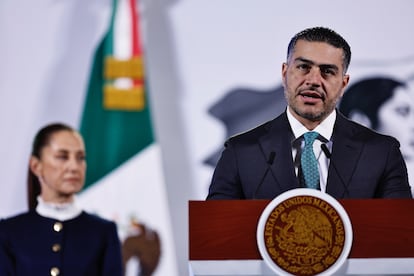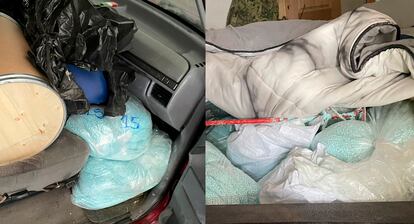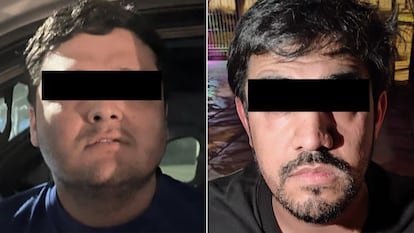Mexico’s Sheinbaum sends security czar to deal with violence crisis in Sinaloa
Authorities signal that the war in the drug cartel’s stronghold is at the top of their list of priorities, in a double attempt to appease Trump and silence internal criticism of their strategy against organized crime

Mexican authorities announced the largest seizure of fentanyl in history at a critical time for the country’s security. An operation led by the Navy resulted in the seizure of a ton and a half of synthetic drug pills, the equivalent of 20 million doses and worth $400 million. The latest blow to organized crime took place in the state of Sinaloa, the historic epicenter of drug trafficking in Mexico, and just on the verge of crossing the threshold of 500 murders after three months of uninterrupted violence as a result of the greatest fracture suffered in over a decade by the cartel founded by Joaquín “El Chapo” Guzmán and Ismael “El Mayo” Zambada. President Claudia Sheinbaum took pride in the haul and announced on Wednesday that Omar García Harfuch, Secretary of Security and architect of her policy against the violence crisis, had traveled to Sinaloa to personally coordinate the strategy on the ground. The president declared that there will be “zero tolerance,” a direct response to the criticism she has received since the start of her administration, and to pressure from U.S. president-elect Donald Trump, who is demanding more forceful action in the fight against criminal groups.
The drug seizure is a breath of fresh air for Sheinbaum’s administration and a calling card for García Harfuch, the man the president trusts to pacify the country. The president asked for a new vote of confidence for her new security strategy, which shows a renewed commitment to the National Guard ― a military body created during the administration of Andrés Manuel López Obrador, with a reported force power of 130,000 troops ― while giving added weight to intelligence, coordination, and investigation tasks. “It is not about [insecurity] decreasing drastically in a short time. It will decrease in the time that it takes, because the important thing is to coordinate all the actions and the strategy,” she said.
“It is an investigation that has been going on for a long time, and yesterday it yielded these results. It is the largest seizure of fentanyl pills ever made,” Sheinbaum stressed. García Harfuch, an official who feels comfortable under the spotlight and who survived an attack by the Jalisco New Generation Cartel in 2020, was in charge of announcing the news on Tuesday night. “These actions will continue until the violence in Sinaloa decreases,” he said. A week after Sheinbaum took office, the secretary was seen walking the streets of Culiacán, the capital of the state in northwestern Mexico, to send the message to the disputing groups about the change in the government’s strategy to confront the war for control of the Sinaloa Cartel.

Hours before the announcement of the raid, Culiacán woke up to the sound of gunfire and a loud explosion, which caused panic among the population and led to people thinking it was a car bomb attack, which was later ruled out by federal authorities. The incident left no injuries, but increased the questions against the governor of Sinaloa, Rubén Rocha Moya, a member of Morena, the party of Sheinbaum and López Obrador.
The government was in need of a success story like the fentanyl haul to counter the terror that drug traffickers have imposed on the civilian population in several states, as well as the narrative that the authorities have lost control of parts of the country, a message that has resonated in Washington, especially among the most conservative sectors. In the first weeks of Sheinbaum’s presidency, beginning on October 1, there was the decapitation of a mayor in Guerrero, the explosion of two car bombs in Guanajuato, and massacres such as the one at the Los Cantaritos bar in Querétaro, a state that is not usually among the country’s hot spots.
The raid in Sinaloa took place in two separate operations, in coordination with elements of the National Guard, the Army, the Secretariat of Public Security and the Attorney General’s Office. In addition to the seizure of weapons and tactical equipment, two criminal leaders were also captured, Elier Jassiel Esquerra Félix and Javier Alonso Vázquez Sánchez, linked to the Beltrán Leyva Cartel, former allies and later enemies of the Sinaloa Cartel during the days of El Chapo. The arrests took place in Guasave, in the north of the state, which was plunged into violence after the capture of El Mayo last July in the United States. Amid accusations of treason, the two factions that led the cartel, Los Mayos and Los Chapitos, have been waging an all-out war since September 9.

At the start of her term, Sheinbaum placed the blame for the Sinaloa crisis on Washington, accusing the Biden administration of stirring up the drug hornet’s nest and capturing Zambada without previously notifying the Mexican government. But it is a message that she will not be able to maintain against Trump, who is much more volatile and impulsive than his predecessor. The Republican has threatened a tariff war and has made the renegotiation of the USMCA free trade agreement between Mexico, the United States and Canada conditional on his partners cracking down on key fronts such as migration and the trafficking of fentanyl, a drug that causes tens of thousands of deaths in the U.S. each year and is at the center of the latest crusade against Mexican cartels. Sheinbaum said this week that her team is seeking a meeting with the next president of the United States in the near future.
Sign up for our weekly newsletter to get more English-language news coverage from EL PAÍS USA Edition
Tu suscripción se está usando en otro dispositivo
¿Quieres añadir otro usuario a tu suscripción?
Si continúas leyendo en este dispositivo, no se podrá leer en el otro.
FlechaTu suscripción se está usando en otro dispositivo y solo puedes acceder a EL PAÍS desde un dispositivo a la vez.
Si quieres compartir tu cuenta, cambia tu suscripción a la modalidad Premium, así podrás añadir otro usuario. Cada uno accederá con su propia cuenta de email, lo que os permitirá personalizar vuestra experiencia en EL PAÍS.
¿Tienes una suscripción de empresa? Accede aquí para contratar más cuentas.
En el caso de no saber quién está usando tu cuenta, te recomendamos cambiar tu contraseña aquí.
Si decides continuar compartiendo tu cuenta, este mensaje se mostrará en tu dispositivo y en el de la otra persona que está usando tu cuenta de forma indefinida, afectando a tu experiencia de lectura. Puedes consultar aquí los términos y condiciones de la suscripción digital.









































